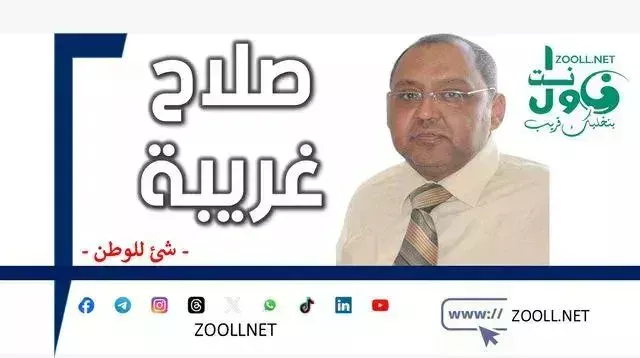Who is behind this biased information and rumors? Why do we believe it so easily? – Something for the homeland – ✍️ Mr. Salah Ghariba

Malicious rumors are spreading daily within the Sudanese community in Egypt, aimed at spreading panic and anxiety among community members, and they are spreading quickly because of the owners (copy and paste) and some false affiliates to the media of our time. Malicious news and rumors spread like wildfire, taking advantage of social media platforms and their rapid spread to sow the seeds of conflict and doubt in people's souls, but who is behind this phenomenon? Why are some people so quick to believe these rumors without verifying their authenticity? What is the role of Sudanese media professionals in Egypt in confronting this phenomenon?
Who is behind this biased information and rumors?
There is no single, specific answer to this question. The reasons for publishing this information are rather diverse, rather it is a complex web in which the threads of several parties are intertwined, including political parties that seek to use biased information and rumors to obtain results. their own agenda, whether by stoking discord between various groups in society, or by distorting the reputation of certain people or entities, or by influencing public opinion or important political events. This is evident from the news affecting the Sudanese embassy and the events occurring in rapid succession. rumors that coincided with the arrival of Ambassador, Lieutenant General, First Staff Engineer Imad al-Din Adawi, to take office as Sudan's Ambassador to Egypt. He is a man of the Sudanese military establishment without equal.
Some media outlets, especially those that lack credibility and professionalism, seek to spread biased information and rumors to gain attention and gain more opinions and financial profits, even if they later publish a lie about the information. Some people may spread rumors unintentionally, out of pure motivation. curiosity or desire to share exciting news, without verifying its authenticity, and some parties hostile to countries or people may seek to spread biased information and rumors to destabilize and sow terror in the souls of people.
Why do we believe rumors so easily?
There are many reasons why people easily believe rumors, including curiosity. By nature, we are drawn to interesting news, especially those related to unusual events or secret conspiracies. We often believe rumors that spark feelings of fear and anxiety, especially in light of crises. and disasters. Sometimes we believe rumors because we lack reliable information about a topic, causing us to give in to whatever information is available, even if it is incorrect. We may believe rumors if they come from a source we trust, such as a friend. , a family member or a famous person, without checking. What he says is true, and we can believe rumors if we hear or read them over and over again, even if they are not true.
Sudanese media professionals in Egypt have an important role to play in combating biased information and rumors, by verifying the authenticity of information before publishing it, relying on reliable sources and verifying the validity of the data and facts. Media professionals must educate people about the dangers of biased information and rumors and how to distinguish them from true information. Media professionals must refute rumors quickly and clearly, while providing correct information to the public. among the public and encourage them to think logically and not believe everything they read or hear. Media professionals should cooperate with relevant authorities, such as government and civil organizations, to combat biased information and rumors, including the Sudan Embassy website and others. digital media, or communicate with credible parties in this regard.
I spoke a lot about the need for the return of the media advisor to our embassy in Cairo and the formation of a media council composed of serving Sudanese media professionals present in Egypt, as well as the importance of disseminating the media literacy culture, which helps develop critical thinking skills and enable the individual to analyze and evaluate information objectively, distinguish facts and opinions and identify sources of information 'information. Reliable, in addition to strengthening media responsibility and motivating the individual to use the media in a positive and constructive manner, spreading correct information, combating rumors and fake news, helping the individual to become aware of the dangers of certain content on the Internet, such as hate speech and pornographic content, teach them to avoid and deal with them, and support positive participation. to express one's opinion in an effective and influential manner, and to participate in public dialogue in a constructive and positive manner.
Mechanisms for spreading the culture of media education by integrating media education into educational programs to ensure that all students acquire the necessary knowledge and skills to deal effectively with the media, by organizing awareness programs aimed at various segments of society to increase the level of awareness about media literacy. the importance of media education and how to apply it in daily life, and involve the family in the process of spreading the culture of media education by encouraging dialogue with children about the information they are exposed through the media, directing them towards the optimal use of these media, and investing in the capacities of the media to raise awareness, through the production of programs and films aimed at explaining the concepts of media education and its importance, and to provide advice on how to process information critically.
Together, let's spread the culture of media literacy and create a better future!
Source link





